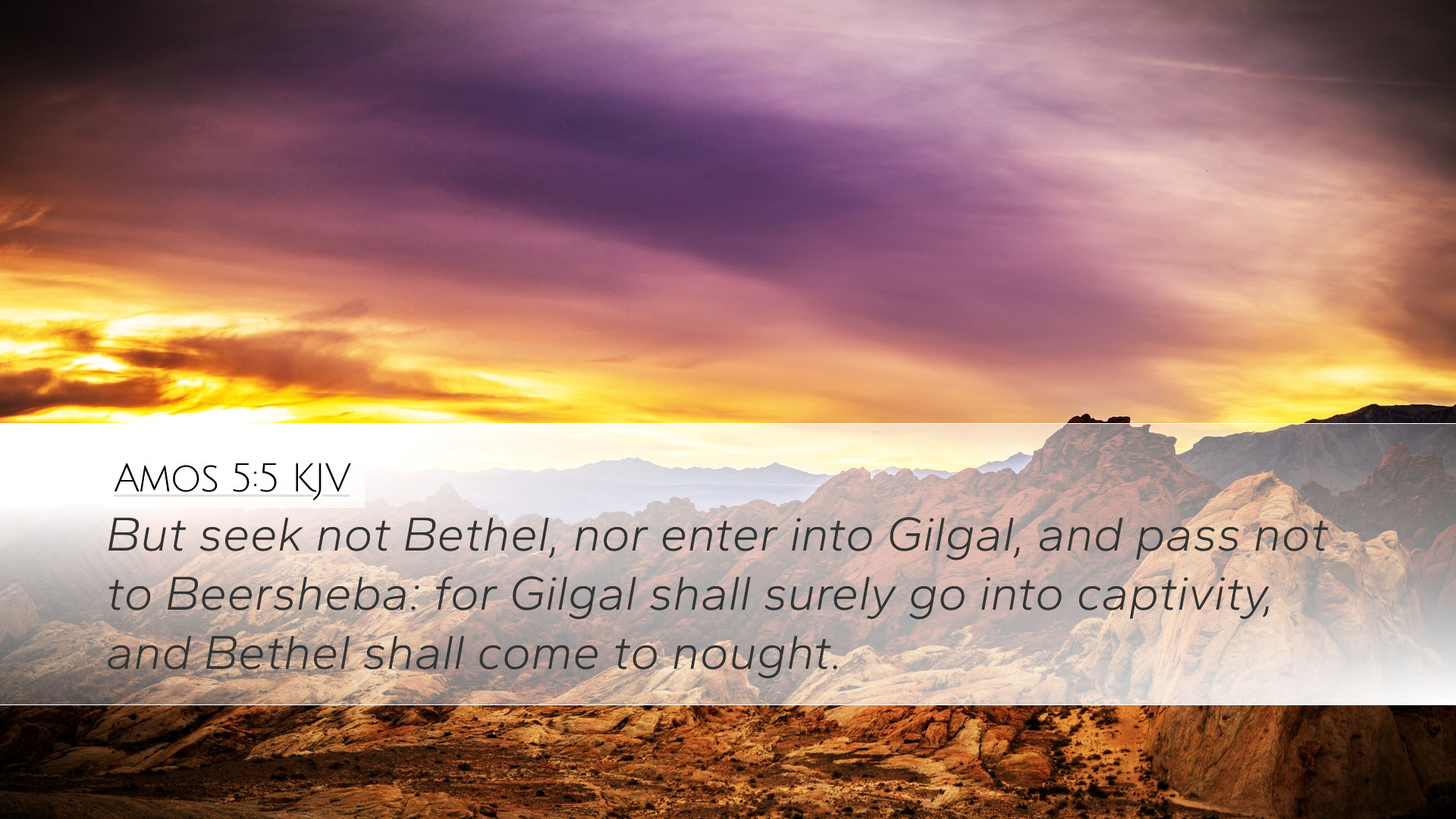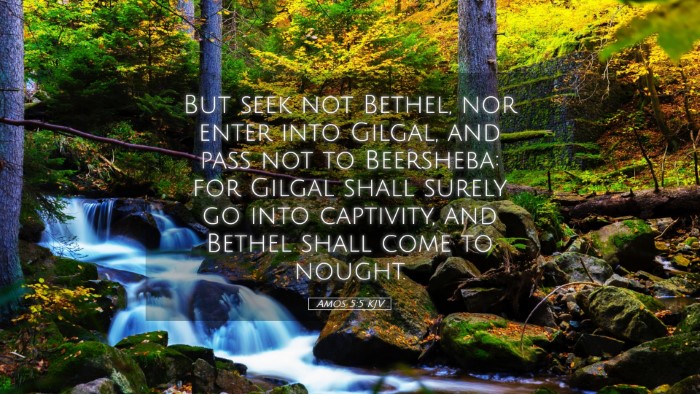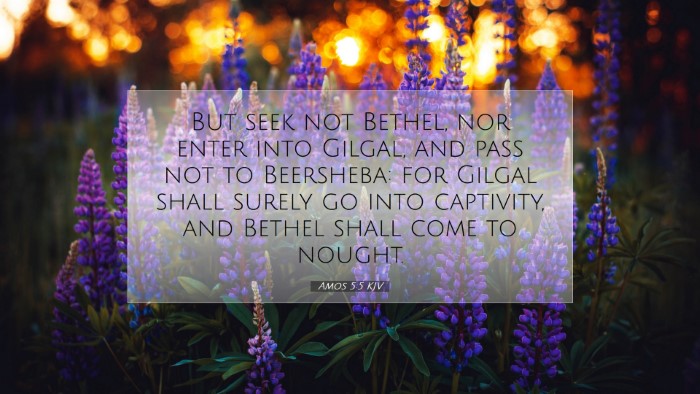Old Testament
Genesis Exodus Leviticus Numbers Deuteronomy Joshua Judges Ruth 1 Samuel 2 Samuel 1 Kings 2 Kings 1 Chronicles 2 Chronicles Ezra Nehemiah Esther Job Psalms Proverbs Ecclesiastes Song of Solomon Isaiah Jeremiah Lamentations Ezekiel Daniel Hosea Joel Amos Obadiah Jonah Micah Nahum Habakkuk Zephaniah Haggai Zechariah MalachiAmos 5:5
Amos 5:5 KJV
But seek not Bethel, nor enter into Gilgal, and pass not to Beersheba: for Gilgal shall surely go into captivity, and Bethel shall come to nought.
Amos 5:5 Bible Commentary
Commentary on Amos 5:5
Verse: "But seek not Beth-el, nor enter into Gilgal, and pass not to Beer-sheba: for Gilgal shall surely go into captivity, and Beth-el shall come to naught."
Introduction
The prophetic book of Amos addresses the social injustices and religious corruption of Israel during the period of prosperity in the 8th century BCE. In Amos 5:5, the prophet's plea reflects a deeper theological and moral concern. The call to "seek not Beth-el" and "Gilgal" is fundamentally a rejection of empty religious rituals detached from true devotion and social justice. This commentary synthesizes insights from several public domain sources to explore the profound implications of this verse for contemporary faith communities.
The Context of Amos
Amos, a shepherd and fig-picker from Tekoa, was called by God to prophesy primarily against the Northern Kingdom of Israel. His message emphasizes both social ethics and the necessity of genuine worship. The significance of Beth-el and Gilgal lies in their historical role as places of worship and national identity. Matthew Henry notes that these sites were associated with Israel’s early history and significant moments such as the establishment of the royal sanctuary. In this light, the condemnation of these places reveals the disconnect between the people’s worship practices and their moral failings.
Seeking vs. Worshiping
In Amos 5:5, the imperative "seek not" emphasizes a choice to not pursue superficial worship. Albert Barnes elucidates this by suggesting that to seek these places signifies an attempt to find God in locations that have become synonymous with apostasy. Instead of genuine faith, these sites represented a hollow spirituality where rituals overshadowed righteousness.
“The Lord does not favor the places of false worship, and He rather desires the hearts of His people.” This highlights the truth that God is more concerned with the moral state of His people than with their religious observances.
Significance of the Locations
- Beth-el: Known as "the house of God," it was a site where Jeroboam set up a golden calf. Adam Clarke points out that this shrine had become a focal point for idolatry, distorting true worship and leading Israel astray.
- Gilgal: Initially a sacred place of Israel's covenant renewal after entering the Promised Land, it too became corrupted. It symbolized a turning away from God’s commands. Clarke notes that although it once represented deliverance, it had deteriorated into a symbol of rebellion.
- Beer-sheba: Though more distant, it reflects the northward shift of worship from Judah to Israel. Its inclusion in the admonition reveals that the religious decline permeated even the historically faithful regions.
The Warning of Captivity
The prophetic declaration that "Gilgal shall surely go into captivity" serves as both an immediate forewarning and a theological reflection on divine judgment. This concept is crucial for understanding the inevitable consequences of abandoning true worship. Matthew Henry reflects that the judgment incurred upon these places foreshadows a time when Israel would face exile, emphasizing that God's presence cannot be sought in places where His holiness is compromised.
Theological Implications
The warning against these sites can be seen as a broader critique of any manufactured or insincere worship. Barnes states that God desires worship not tethered to specific locations or rituals but rooted in integrity and justice. This assertion compels modern believers to reevaluate their own places of worship, asking whether they reflect genuine faith or merely the trappings of religiosity absent of a relationship with God.
Application for Today
The message of Amos 5:5 is timeless, calling believers today to examine the state of their worship practices and societal engagement. As churches and communities navigate contemporary issues, the imperative to uphold justice and righteousness remains paramount. Henry stresses that this call to righteousness is a hallmark of true spirituality; without it, worship becomes meaningless.
“True worshippers will seek the Lord in spirit and truth, embodying their faith through acts of love and justice.” Churches must guard against the temptation of seeking popularity or cultural relevance at the cost of spiritual authenticity.
Conclusion
Amos 5:5 invites a profound reflection on the nature of worship and the obligation of the faithful to pursue a life that honors God through both genuine devotion and social responsibility. As proclaimed by the prophets of old, divine judgment awaits those who only pay lip service to religious observance without embodying the justice and righteousness that God desires. This clarion call to reflection and action holds significant relevance for pastors, theologians, and all believers today.


